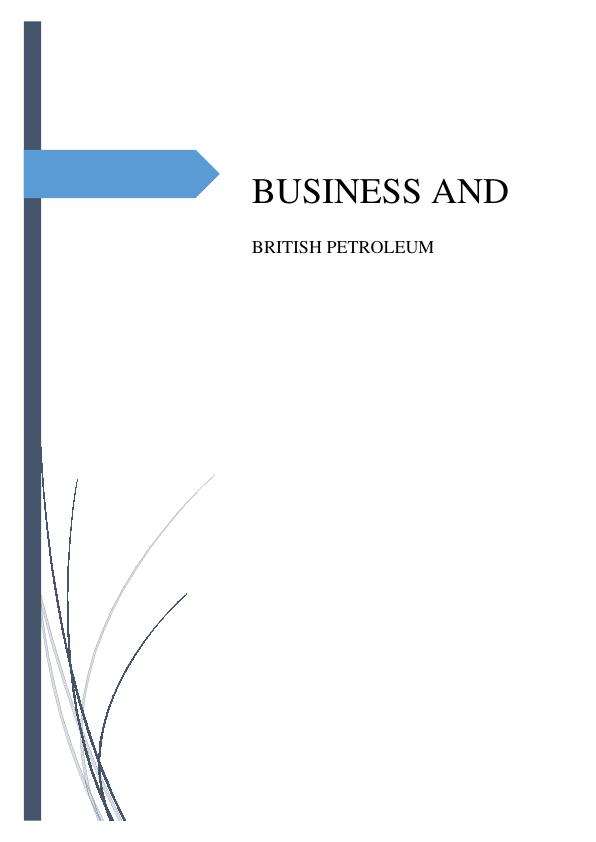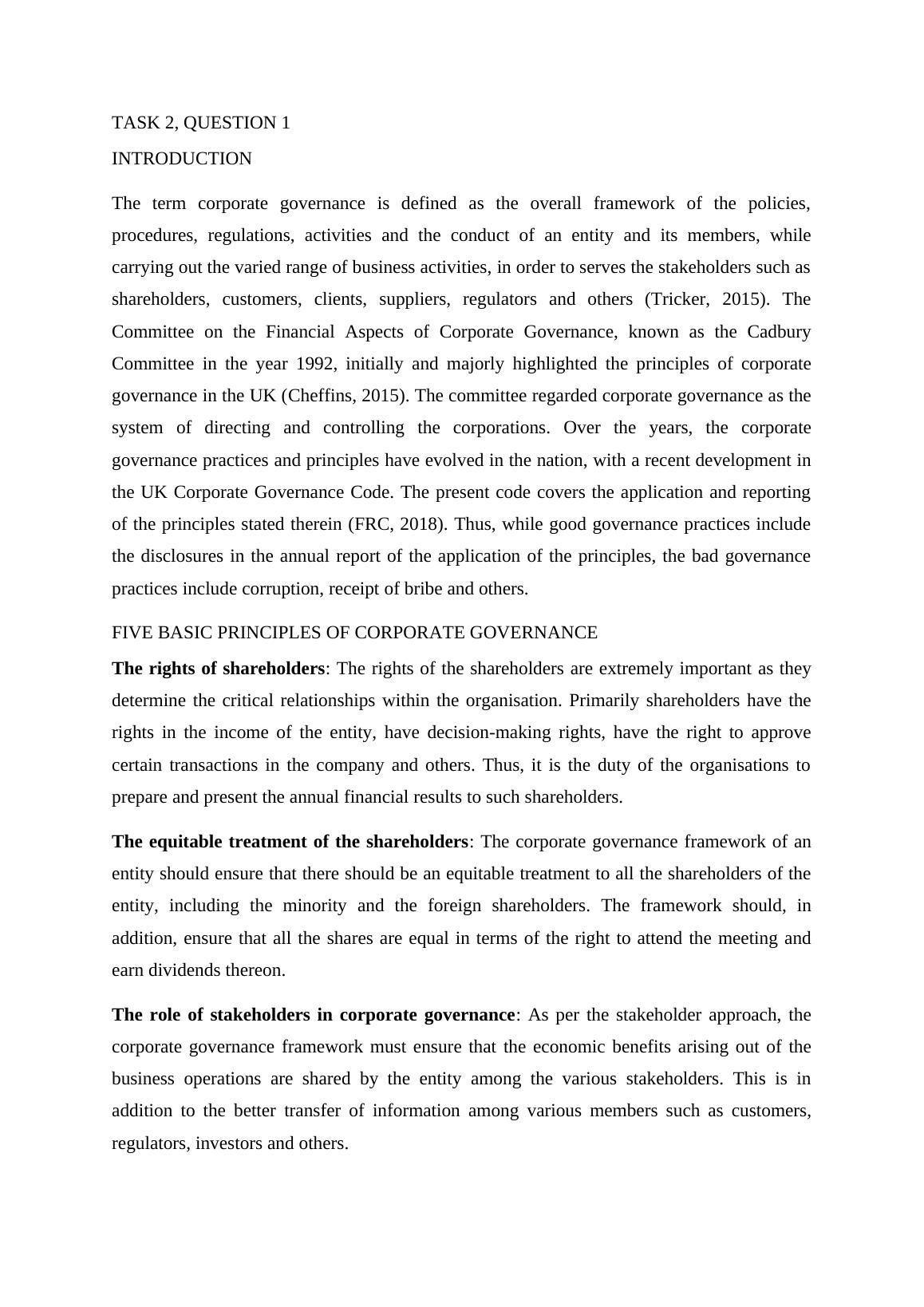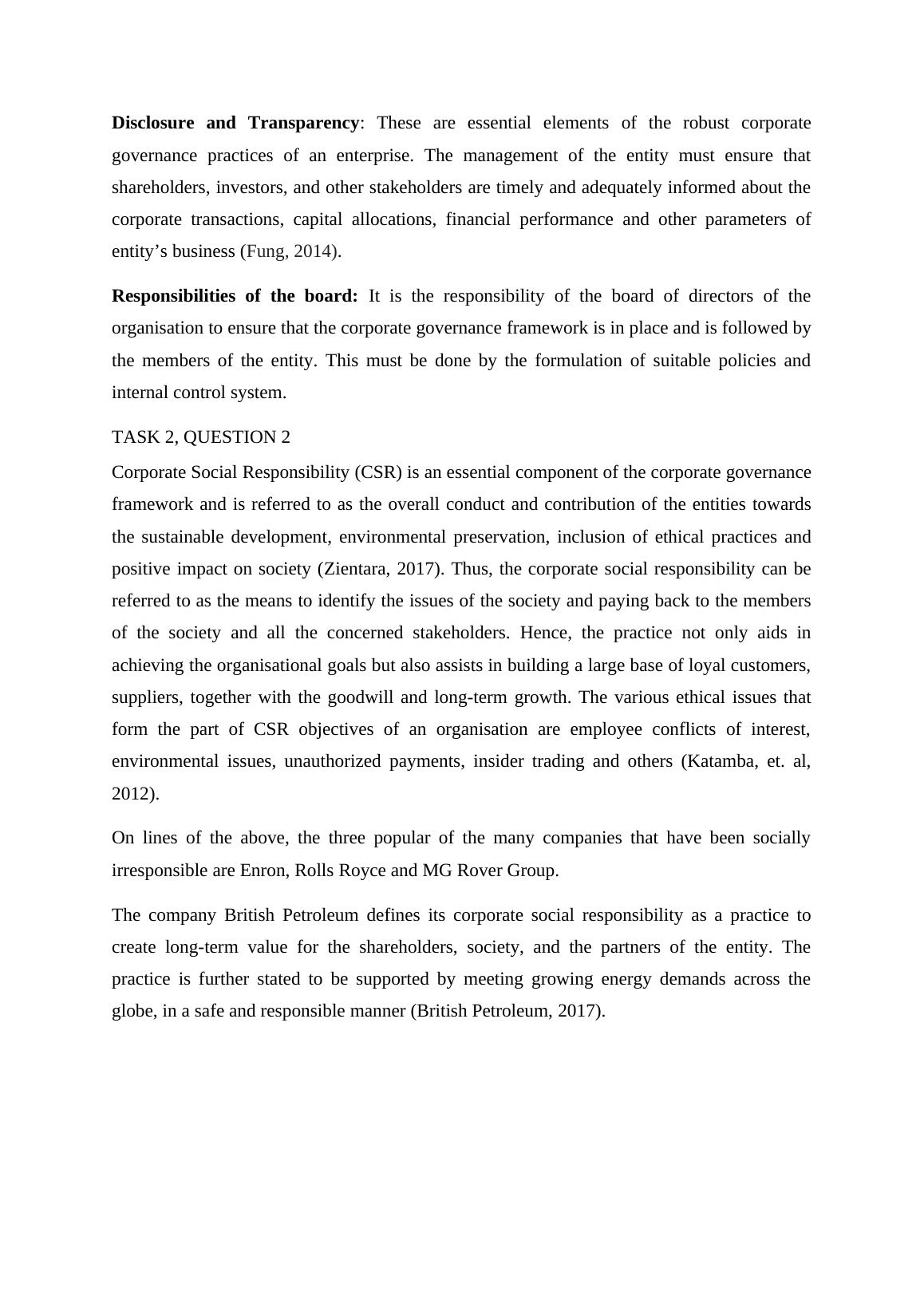Corporate Governance and Corporate Social Responsibility: A Case Study of British Petroleum
Added on 2023-05-26
8 Pages1708 Words101 Views
14 December 2018

TASK 2, QUESTION 1
INTRODUCTION
The term corporate governance is defined as the overall framework of the policies,
procedures, regulations, activities and the conduct of an entity and its members, while
carrying out the varied range of business activities, in order to serves the stakeholders such as
shareholders, customers, clients, suppliers, regulators and others (Tricker, 2015). The
Committee on the Financial Aspects of Corporate Governance, known as the Cadbury
Committee in the year 1992, initially and majorly highlighted the principles of corporate
governance in the UK (Cheffins, 2015). The committee regarded corporate governance as the
system of directing and controlling the corporations. Over the years, the corporate
governance practices and principles have evolved in the nation, with a recent development in
the UK Corporate Governance Code. The present code covers the application and reporting
of the principles stated therein (FRC, 2018). Thus, while good governance practices include
the disclosures in the annual report of the application of the principles, the bad governance
practices include corruption, receipt of bribe and others.
FIVE BASIC PRINCIPLES OF CORPORATE GOVERNANCE
The rights of shareholders: The rights of the shareholders are extremely important as they
determine the critical relationships within the organisation. Primarily shareholders have the
rights in the income of the entity, have decision-making rights, have the right to approve
certain transactions in the company and others. Thus, it is the duty of the organisations to
prepare and present the annual financial results to such shareholders.
The equitable treatment of the shareholders: The corporate governance framework of an
entity should ensure that there should be an equitable treatment to all the shareholders of the
entity, including the minority and the foreign shareholders. The framework should, in
addition, ensure that all the shares are equal in terms of the right to attend the meeting and
earn dividends thereon.
The role of stakeholders in corporate governance: As per the stakeholder approach, the
corporate governance framework must ensure that the economic benefits arising out of the
business operations are shared by the entity among the various stakeholders. This is in
addition to the better transfer of information among various members such as customers,
regulators, investors and others.
INTRODUCTION
The term corporate governance is defined as the overall framework of the policies,
procedures, regulations, activities and the conduct of an entity and its members, while
carrying out the varied range of business activities, in order to serves the stakeholders such as
shareholders, customers, clients, suppliers, regulators and others (Tricker, 2015). The
Committee on the Financial Aspects of Corporate Governance, known as the Cadbury
Committee in the year 1992, initially and majorly highlighted the principles of corporate
governance in the UK (Cheffins, 2015). The committee regarded corporate governance as the
system of directing and controlling the corporations. Over the years, the corporate
governance practices and principles have evolved in the nation, with a recent development in
the UK Corporate Governance Code. The present code covers the application and reporting
of the principles stated therein (FRC, 2018). Thus, while good governance practices include
the disclosures in the annual report of the application of the principles, the bad governance
practices include corruption, receipt of bribe and others.
FIVE BASIC PRINCIPLES OF CORPORATE GOVERNANCE
The rights of shareholders: The rights of the shareholders are extremely important as they
determine the critical relationships within the organisation. Primarily shareholders have the
rights in the income of the entity, have decision-making rights, have the right to approve
certain transactions in the company and others. Thus, it is the duty of the organisations to
prepare and present the annual financial results to such shareholders.
The equitable treatment of the shareholders: The corporate governance framework of an
entity should ensure that there should be an equitable treatment to all the shareholders of the
entity, including the minority and the foreign shareholders. The framework should, in
addition, ensure that all the shares are equal in terms of the right to attend the meeting and
earn dividends thereon.
The role of stakeholders in corporate governance: As per the stakeholder approach, the
corporate governance framework must ensure that the economic benefits arising out of the
business operations are shared by the entity among the various stakeholders. This is in
addition to the better transfer of information among various members such as customers,
regulators, investors and others.

Disclosure and Transparency: These are essential elements of the robust corporate
governance practices of an enterprise. The management of the entity must ensure that
shareholders, investors, and other stakeholders are timely and adequately informed about the
corporate transactions, capital allocations, financial performance and other parameters of
entity’s business (Fung, 2014).
Responsibilities of the board: It is the responsibility of the board of directors of the
organisation to ensure that the corporate governance framework is in place and is followed by
the members of the entity. This must be done by the formulation of suitable policies and
internal control system.
TASK 2, QUESTION 2
Corporate Social Responsibility (CSR) is an essential component of the corporate governance
framework and is referred to as the overall conduct and contribution of the entities towards
the sustainable development, environmental preservation, inclusion of ethical practices and
positive impact on society (Zientara, 2017). Thus, the corporate social responsibility can be
referred to as the means to identify the issues of the society and paying back to the members
of the society and all the concerned stakeholders. Hence, the practice not only aids in
achieving the organisational goals but also assists in building a large base of loyal customers,
suppliers, together with the goodwill and long-term growth. The various ethical issues that
form the part of CSR objectives of an organisation are employee conflicts of interest,
environmental issues, unauthorized payments, insider trading and others (Katamba, et. al,
2012).
On lines of the above, the three popular of the many companies that have been socially
irresponsible are Enron, Rolls Royce and MG Rover Group.
The company British Petroleum defines its corporate social responsibility as a practice to
create long-term value for the shareholders, society, and the partners of the entity. The
practice is further stated to be supported by meeting growing energy demands across the
globe, in a safe and responsible manner (British Petroleum, 2017).
governance practices of an enterprise. The management of the entity must ensure that
shareholders, investors, and other stakeholders are timely and adequately informed about the
corporate transactions, capital allocations, financial performance and other parameters of
entity’s business (Fung, 2014).
Responsibilities of the board: It is the responsibility of the board of directors of the
organisation to ensure that the corporate governance framework is in place and is followed by
the members of the entity. This must be done by the formulation of suitable policies and
internal control system.
TASK 2, QUESTION 2
Corporate Social Responsibility (CSR) is an essential component of the corporate governance
framework and is referred to as the overall conduct and contribution of the entities towards
the sustainable development, environmental preservation, inclusion of ethical practices and
positive impact on society (Zientara, 2017). Thus, the corporate social responsibility can be
referred to as the means to identify the issues of the society and paying back to the members
of the society and all the concerned stakeholders. Hence, the practice not only aids in
achieving the organisational goals but also assists in building a large base of loyal customers,
suppliers, together with the goodwill and long-term growth. The various ethical issues that
form the part of CSR objectives of an organisation are employee conflicts of interest,
environmental issues, unauthorized payments, insider trading and others (Katamba, et. al,
2012).
On lines of the above, the three popular of the many companies that have been socially
irresponsible are Enron, Rolls Royce and MG Rover Group.
The company British Petroleum defines its corporate social responsibility as a practice to
create long-term value for the shareholders, society, and the partners of the entity. The
practice is further stated to be supported by meeting growing energy demands across the
globe, in a safe and responsible manner (British Petroleum, 2017).

End of preview
Want to access all the pages? Upload your documents or become a member.
Related Documents
Corporate Governance and Report Politics in the Oil and Gas Industrylg...
|13
|4252
|204
Professional ethics and Regulations : Assignmentlg...
|11
|2862
|368
What is Corporate Governance? - Definitionlg...
|18
|4924
|90
Auditors and Corporate Governancelg...
|14
|1280
|29
Corporate Bankruptcies in Australia: Analysis of Management Policies and Corporate Governance Practiceslg...
|10
|2418
|383
ACC03043 - Agency Theory of Corporate Governance | Assignmentlg...
|4
|842
|260